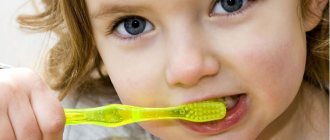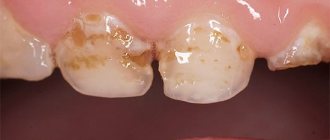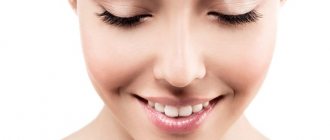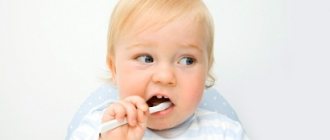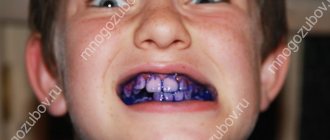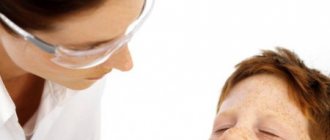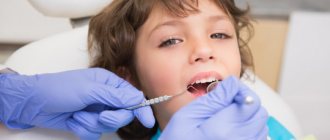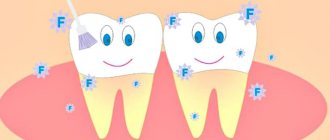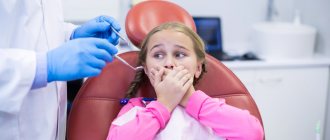How is professional hygiene of children’s primary and permanent teeth carried out?
First, the pediatric dentist determines the level of hygiene using special tablets or liquids. Tablets and liquids have a pleasant taste and do not cause discomfort to the child, but after chewing or application they clearly show the places on the enamel where there is plaque. After this, the doctor proceeds directly to the hygienic procedure. Depending on the age and amount of plaque on the teeth, the doctor determines the type of cleaning that is necessary in this particular case.
Types of professional teeth cleaning:
- Professional cleaning of baby teeth using a brush and abrasive paste (from 3 years of age) This type of cleaning is used for children with a baby teeth. During brushing, teeth are completely cleared of soft and pigmented plaque using a circular brush or using an eraser and polishing paste.
- Professional teeth cleaning for children with mixed and permanent dentition using the Air-Flow device with a special glycine-based powder (from 4 years of age). The pressure washer delivers a mixture of water, air and powder. The procedure uses low-abrasive Clinpro Prophy Powder based on the water-soluble amino acid glycine. Due to its low abrasiveness, the powder has a gentle effect on tooth enamel and effectively removes plaque and enamel darkening caused by food dyes.
- Professional teeth cleaning for children with permanent dentition using the Air-Flow device with a special powder based on calcium bicarbonate (from 10 years of age). This type of cleaning is used in children and adolescents with a large amount of pigmented plaque on the teeth and in patients with braces.
- Professional teeth cleaning using an ultrasonic device. The ultrasonic cleaning method is most often used in adolescence. In adolescents, due to hormonal changes and diet, soft plaque quickly develops into hard supra- and subgingival dental plaque. Baby teeth are not subjected to professional ultrasonic cleaning, since the enamel of baby teeth is thin (only if indicated).
After professional cleaning, the teeth are polished and coated with special mineral gels to strengthen the enamel.
Features of oral hygiene in children in the first months of life
A child is born completely sterile, and, starting from the first day of life, the oral cavity is intensively populated by all kinds of microbes, many of which are the causative agents of various diseases, such as caries, thrush, childhood stomatitis, etc.
Careful care of your baby’s gums will help minimize the negative impact of microorganisms. After each feeding, the baby’s gums are wiped with wet wipes soaked in xylitol.
After the first teeth appear, the task of parents is to teach the baby to brush them correctly. The duration of the first sessions is only 15-20 seconds; Gradually, the time for brushing your teeth increases.
First, the baby is taught to use a brush without applying paste to it. Children love to imitate adults, so they are happy to repeat all the movements after mom and dad. The task of parents in this case is to teach the child to hold the brush correctly and position it at the right angle, as well as to rinse the mouth thoroughly after brushing. After the baby has mastered these skills, you should buy him a baby toothpaste that does not contain fluoride.
How often should you bring your child for professional dental hygiene?
It is recommended that children undergo professional hygienic teeth cleaning every six months from the age of 3 years. It is during this short period that a dense plaque forms on the teeth, which cannot be removed with a regular brush and paste.
Particular attention should be paid to professional dental hygiene in children who are undergoing orthodontic treatment with braces or plates, as well as children who are predisposed to the rapid formation of plaque. Such patients are recommended to come for professional dental hygiene once every 3 months.
Young patients who visit a pediatric dentist at DLclinic are provided with bonuses as part of the “Children’s Smile” promotion:
- Free medical examinations twice a year;
- During the medical examination, a free diagnosis of dental plaque on one tooth is carried out using a special marker to check the need for professional dental hygiene;
- 20% discount on professional dental hygiene;
- 20% discount on remotherapy;
- Free hygiene training.
Oral hygiene in children: basic rules
It is adults who can help children learn simple preventive measures that will prevent the development of caries and keep children's teeth beautiful, healthy and strong.
So, the basic rules for regular child dental care:
- You need to brush your teeth twice a day using special brushes and toothpastes designed specifically for children;
- the toothbrush should be selected taking into account the age of the child, as well as the condition of the teeth and gums;
- after each use, the brush is thoroughly washed with soap and stored in a cup provided for this purpose with the bristles facing up;
- the number of snacks, especially sweet ones, must be minimized;
- in addition to a toothbrush and toothpaste, you must use dental floss;
- Visit a pediatric dentist once every six months.
Professional hygiene in pediatric dentistry - prices*
| Name of service | Price | |
| Professional teeth cleaning for children from 3 to 5 years old, paste + brush | Make an appointment | 2000 rub. |
| Professional teeth cleaning for children with mixed dentition from 5 to 10 years old, gentle - Air Flow glycine | Make an appointment | 2500 rub. |
| Professional teeth cleaning for children from 10 years of age, Air Flow calcium carbonate | Make an appointment | 3000 rub. |
*The price list presented on the website is not complete and is not intended for independent calculation of the cost of treatment. You can request a full price list at the reception desks of the DLclinic medical center. However, the exact cost of the procedures is determined by the doctor after examining the patient.
Take advantage of the special offer “Healthy Teeth”
To conduct professional oral hygiene for children and adolescents, sign up for a consultation with a DLclinic pediatric dentist using the appointment form on the website or call us at tel. (812) 232-88-25, 233-19-08. The administrator will help you choose a convenient time for the procedure.
Make an appointment
(812) 232-88-25, 233-19-08
Professional oral hygiene for children
Hygienic procedures in the dentist’s office are united by a single goal - strengthening the tissues of the oral cavity and ensuring high-quality prevention of the development of dental diseases. Such measures include careful removal of plaque and deposits, sealing fissures, that is, natural depressions on chewing teeth, as well as treating the enamel with protective fluoride-containing compounds.
At a preventive appointment, the dentist will also tell you how to treat the baby’s oral cavity if it is too early for him to brush his teeth on his own, how to ensure proper care of baby teeth and how to choose suitable hygiene products, as well as give valuable advice and recommendations on the prevention of dental diseases. Parents need to listen carefully to all the instructions of the specialist and do not forget to put them into practice - a responsible approach will ensure the health of the child’s oral cavity in the future, when permanent teeth appear.
Category Children Published by Mister stomatolog
Methodology
The ultrasonic cleaning procedure begins with an examination, during which the dentist determines the volume of deposits and the quality of oral hygiene. If necessary, the patient is given local anesthesia.
Further, cleansing takes place in several stages:
- Cleaning the visible part of the crowns from soft deposits.
- Removing tartar along the gum line .
- Curettage of periodontal pockets.
- In order to remove deposits located deep in the pores of the enamel, ultrasonic cleaning the Air-Flow teeth cleaning system
- Then they begin to level the dental surface using a special micro-abrasive paste and a grinding attachment.
- Finally, the crowns are coated with fluoride to strengthen the enamel.
In this video, a specialist talks about the procedure:
Care
In order for the effect of whiteness and cleanliness of teeth to last as long as possible, it is necessary to adhere to standard rules of oral hygiene:
- You should not abuse coloring and carbohydrate products, which lead to the appearance of bacterial deposits and enamel pigmentation.
- The main rule is high-quality cleaning of crowns . To do this, you need to use more than just a regular brush. It is necessary to additionally use floss, brushes and rinses. It is also recommended to use an irrigator regularly.
- You should not avoid regular visits to the dentist , who can promptly detect dental diseases at the initial stage of their development.
When should you start brushing your child's teeth?
Probably the most frequently asked question that arises among young mothers and fathers is: When should you start brushing your child’s teeth? According to our pediatric dentists, it is necessary to monitor and care for a child’s oral cavity from the first days of his life, even before the appearance of his first teeth. During this period, you need to carefully wipe the baby’s gums with boiled water at room temperature using a piece of gauze or bandage, or purchase special napkins for cleaning teeth at the pharmacy. It is not recommended to use cotton wool, as it can leave behind fibers and irritate the child's mouth .
This procedure should be carried out after every meal and always before bed. As a rule, during the first procedures the baby may express dissatisfaction, cry and scream. This should not serve as a reason to cancel the procedure. It is necessary to gradually accustom your child to daily dental care, as this will affect his health in adulthood.
Usually, a baby’s first teeth appear 5–6 months after birth. At this time, it is advisable to carry out 1 or 2 teeth cleanings per day. When brushing your teeth, you can use a baby brush with soft bristles or a special finger brush.
Once the child reaches the age of 1 – 1.5 years, it is recommended to begin teaching the child to brush his teeth at least 2 times a day.
Choosing a toothpaste
You can start using toothpastes as early as two years of age. When choosing a remedy, parents should be extremely careful. For baby teeth, organic paste or special gels are optimal. Choose only safe formulations that will not cause harm if swallowed. Watch the amount of paste - it should be about the size of a pea. What requirements must baby pastes meet:
- Excellent for removing plaque.
- Have an antibacterial effect.
- Take care of your gums.
- Gently clean the enamel.
- Have a pleasant taste.
- No dyes or other harmful components.
Good pastes have a shelf life of no more than a year from the date of manufacture.
What to look for when choosing or what components must be included:
- calcium lactate;
- olaflur;
- xylitol;
- plant extracts;
- abrasives.
Dangerous additives that should not be in the product:
- fluorine;
- sodium sulfates;
- preservatives;
- powerful antiseptics.
School-age children can already use toothpastes containing fluoride. Schoolchildren are also recommended to use dental floss to clean the spaces between teeth. Children can use floss more often than toothpaste. After consulting with a dentist, school-age children can include special rinses in their care. To maintain the health of baby teeth and ensure proper bite, it is necessary not only to follow the rules, but also to regularly visit the doctor. The pediatric dentist fully takes into account the characteristics of each little patient and, if necessary, will recommend the right remedy.
